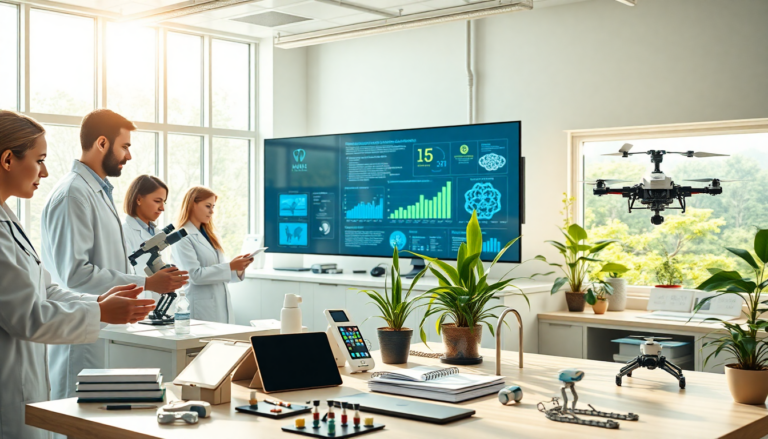Argomenti trattati
Artificial intelligence (AI) is reshaping the world as we know it, standing at the forefront of a technological revolution that’s transforming industries and our everyday lives. From healthcare to environmental conservation, AI is not just a buzzword; it’s a driving force behind innovations that enhance efficiency and effectiveness across various sectors. So, how is AI making waves in areas like vaccine development, human interaction, wildlife protection, and education? Let’s dive in and explore the profound changes these advancements bring to our society.
AI’s Role in Healthcare Innovation
Take a moment to consider the rapid development of COVID-19 vaccines. It’s a prime example of how AI technologies can revolutionize healthcare. By harnessing years of mRNA research alongside AI-driven tools, scientists managed to accelerate the vaccine development process from a typical decade-long timeline to just one year. Isn’t that remarkable? These AI applications didn’t just assist in genome analysis; they streamlined clinical trial data management, allowing researchers to respond swiftly to health threats as they arise. Organizations like the Coalition for Epidemic Preparedness Innovations (CEPI) are now setting ambitious goals, striving to develop and deploy new vaccines within just 100 days—a milestone that’s increasingly within reach thanks to AI.
But AI’s impact doesn’t stop at vaccine development. It’s making significant strides in diagnostics too. Advanced AI systems are now deployed in healthcare facilities worldwide, interpreting medical images with incredible accuracy. For example, Qure.ai has implemented its AI solutions in over 4,500 locations across more than 100 countries, while Viz.ai’s algorithms have found a home in 1,800 hospitals in the U.S. and Europe. These tools not only enhance diagnostic precision but significantly reduce medical errors, showcasing AI’s transformative potential in improving patient care. Can you imagine the implications for healthcare delivery?
Enhancing Human Connections through AI
AI is also redefining our relationships with technology and, in some cases, with each other. The rise of chatbots has introduced new forms of companionship, acting as therapists, friends, or even romantic partners. Platforms like Character.AI have become immensely popular, drawing in millions of users who find comfort and entertainment in these interactions. While experts like Kate Devlin recognize the benefits of AI companionship, they also warn about the potential risks, particularly for vulnerable populations such as children or individuals facing mental health challenges. How do we navigate this evolving landscape responsibly? It’s crucial for society to engage with these technologies while understanding their limitations.
AI and Environmental Conservation
In the sphere of environmental conservation, AI is proving to be an invaluable ally. Conservationists are utilizing motion-sensor cameras to monitor wildlife in remote areas, yet the sheer volume of data can be daunting. Enter AI tools like Wildlife Insights, developed through collaborations between organizations such as the World Wildlife Fund and Google. These technologies allow researchers to scan millions of images with an impressive accuracy of 99.4%, enabling them to focus on what truly matters: protecting biodiversity. By open-sourcing these tools, conservationists around the globe can act swiftly against environmental threats. Isn’t it inspiring how technology can assist in such critical efforts?
AI in Education and Future Prospects
As educational institutions grapple with the implications of AI, its presence in classrooms is becoming more common. Initiatives aimed at training teachers on AI usage are popping up, with partnerships between educational unions and tech giants like OpenAI and Microsoft. These efforts are designed to equip educators with the tools they need to thrive in this new landscape. However, experts like Rose Luckin stress the importance of establishing regulations to protect students, ensuring that technology enhances rather than compromises their learning experiences. What does the future hold for our classrooms?
Looking ahead, the potential applications of AI seem limitless. From designing enzymes to reduce plastic waste to enhancing industrial productivity with AI-driven robotics, the future is bright. As industries continue to integrate AI solutions, the challenge will be to strike a balance between innovation and ethical considerations, fostering a society that reaps the benefits of these advancements while safeguarding its members. Are we ready to embrace the future that AI promises?

